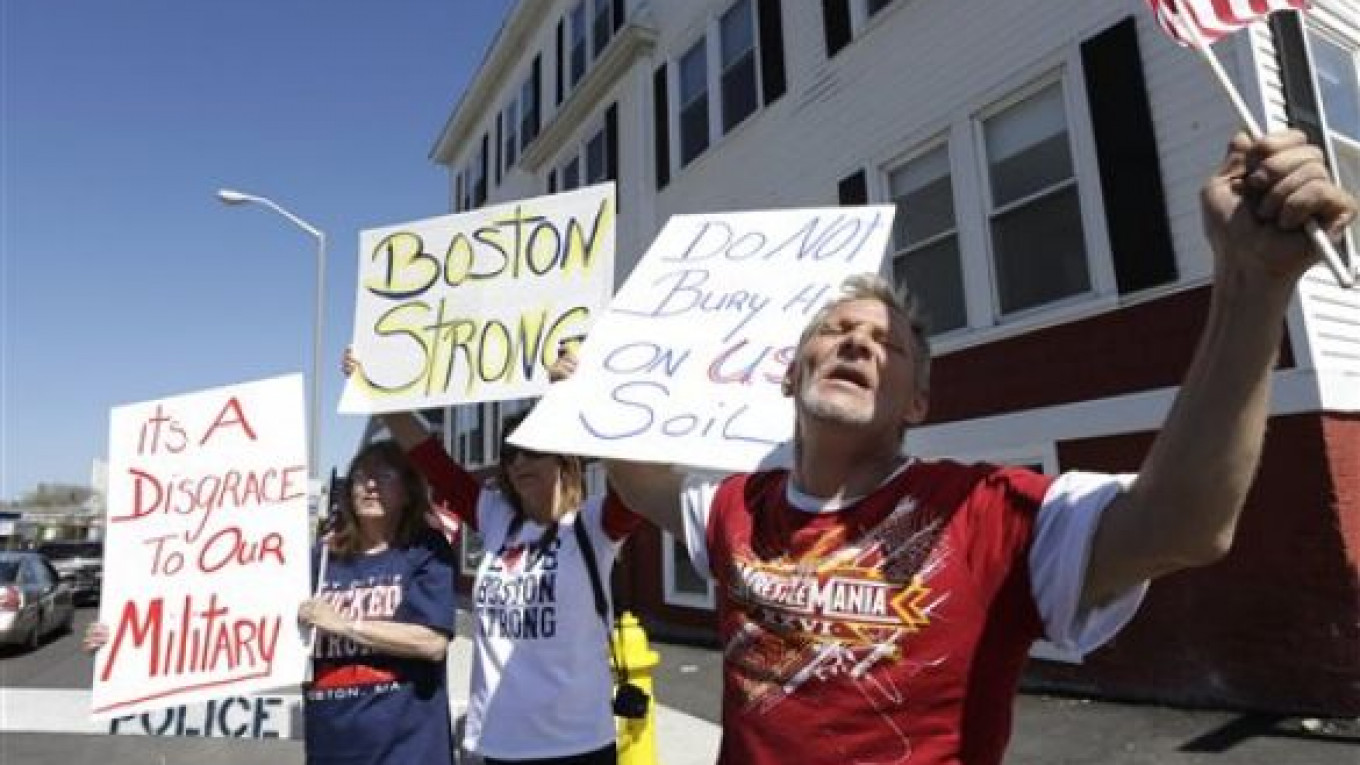WORCESTER, Massachusetts — The uncle of slain Boston Marathon bombing suspect Tamerlan Tsarnaev arrived in Massachusetts to arrange for his nephew's burial, while the funeral director struggled to find a cemetery in the state willing to take the body.
Ruslan Tsarni arrived Sunday with three of his friends and prepared to wash and shroud his nephew's body according to Muslim tradition. The 26-year-old died after a gun battle with police on April 19.
Tsarni, of Maryland, said he understands that "no one wants to associate their names with such evil events."
Funeral director Peter Stefan said he hasn't been able to find a cemetery in Massachusetts willing to take the body. He said he plans to ask the city of Cambridge, where Tsarnaev lived, to provide a burial plot, and if Cambridge turns him down, he will seek help from state officials.
Cambridge city manager Robert Healy said in a statement that there has been no formal application for a burial permit or purchase of a cemetery plot. He said he was urging Tsarnaev's family and the funeral director who has the body not to request a burial permit for the city-owned Cambridge Cemetery.
Healy said the city "would be adversely impacted by the turmoil, protests, and wide spread media presence at such an interment." He said the families who have loved ones interred at the cemetery also deserve to have their deceased family members rest in peace.
Healey said other federal agencies should take the lead in the burial.
Tsarni told reporters that he is arranging for Tsarnaev's burial because religion and tradition call for his nephew to be buried. He would like him buried in Massachusetts because he's lived in the state for the last decade, he said.
"I'm dealing with logistics. A dead person must be buried," he said.
He said he was grateful to Stefan for agreeing to arrange the burial and to his friends for accompanying him to Massachusetts to aid with the funeral.
"These are my friends who feel for me … as I do understand no one wants to associate their names with such evil events," he said.
Tsarnaev died days after the April 15 bombing at the marathon finish line, which killed three people and wounded more than 260 others. His 19-year-old brother, Dzhokhar, was captured.
Stefan said he has received calls from people criticizing him and calling him "un-American" for being willing to handle Tamerlan Tsarnaev's funeral.
"We take an oath to do this. Can I pick and choose? No. Can I separate the sins from the sinners? No," he said. "We are burying a dead body. That's what we do."
A half dozen protesters gathered outside the funeral home Sunday holding signs and American flags and chanting "U.S.A.!" One sign read: "Do not bury him on U.S. soil." Several people drove by the funeral home earlier Sunday and yelled, including one man who shouted, "Throw him off a boat like Osama bin Laden!" The al-Qaida leader was buried at sea after Navy SEALs killed him in a raid on his compound in Pakistan.
The state medical examiner ruled that Tsarnaev died from gunshot wounds and blunt trauma to his head and torso, and authorities have said his brother ran him over in a chaotic getaway attempt. Stefan said the family won't request that an independent medical examiner perform a second autopsy, but representatives from the family's legal team might photograph Tsarnaev's body before it's washed.
Tsarni has denounced the acts his nephews are accused of committing and has said they brought shame to the family and the entire Chechen community. The brothers are ethnic Chechens from Russia who came to the U.S. about a decade ago with their parents. Both parents returned to Dagestan last year.
Tsarni said Sunday that he hopes to eventually see Dzhokhar Tsarnaev, who is in a prison hospital and faces a potential death sentence if convicted of the terrorism plot.
"This is another person left all to himself," he said.
Related articles:
A Message from The Moscow Times:
Dear readers,
We are facing unprecedented challenges. Russia's Prosecutor General's Office has designated The Moscow Times as an "undesirable" organization, criminalizing our work and putting our staff at risk of prosecution. This follows our earlier unjust labeling as a "foreign agent."
These actions are direct attempts to silence independent journalism in Russia. The authorities claim our work "discredits the decisions of the Russian leadership." We see things differently: we strive to provide accurate, unbiased reporting on Russia.
We, the journalists of The Moscow Times, refuse to be silenced. But to continue our work, we need your help.
Your support, no matter how small, makes a world of difference. If you can, please support us monthly starting from just $2. It's quick to set up, and every contribution makes a significant impact.
By supporting The Moscow Times, you're defending open, independent journalism in the face of repression. Thank you for standing with us.
Remind me later.






